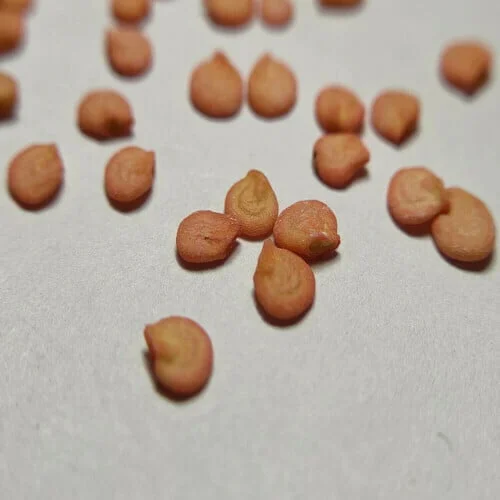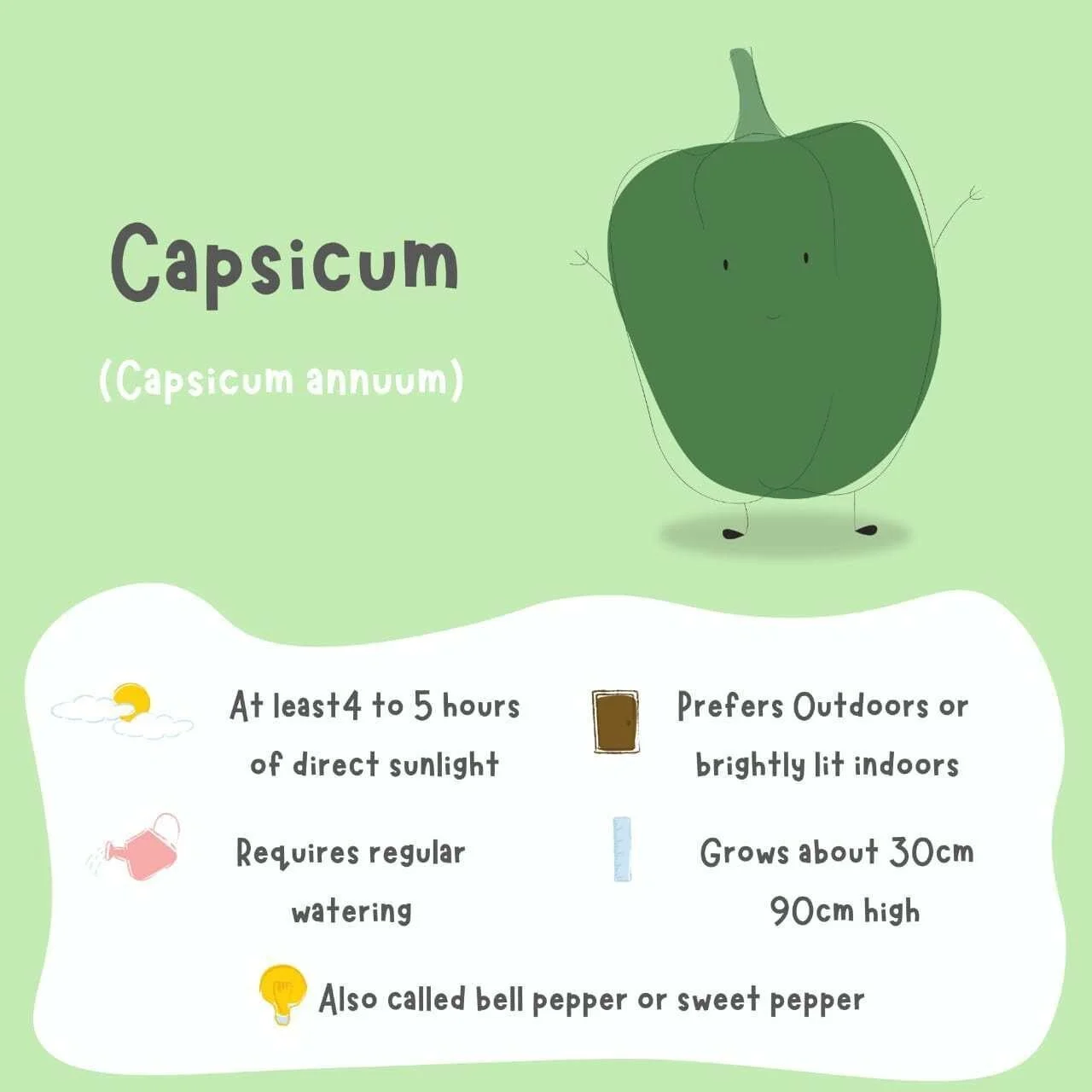Capsicum Green Seeds (10 seeds)
₹20.0
Capsicum is a herb that has medicinal properties. It is added to many Italian dishes. Try our Non-GMO Capsicum Green Seeds. Also, check out our workshops for more details.
PRODUCT DESCRIPTION
Number of seeds in a packet – 10
PLANT DESCRIPTION
- Difficulty Level – easy
- Plant Height – 92 – 182 cm
- Type – outdoor
- Feed – Vermicompost for nutrients every week, Seaweed once a month for greener leaves, and Epsom salt for better blooming once a month
- Watering – every day during summer and alternate days during winter
- Sunlight – full sunlight
- Germination Time – 1 week
- Harvesting Time – 10 – 11 weeks
- Suitable Temperature – 75°F – 85°F
- Season – annual
- Sowing – spring
HOW TO GROW CAPSICUM GREEN FROM SEEDS
- Soak the seeds for 4 – 6 hours before planting.
- Take a Seedling Tray and fill it with Cocopeat.
- Make ½ inch deep hole and put 4 seeds in each hole.
- Fill the hole with Cocopeat and spray with water using a spray gun or spray bottle.
- Water every day (summers) and alternate days (winters).
- Seeds will germinate within a week.
- Re-pot the sapling to a Medium Size Pot in 2 – 4 weeks.
- Full sunlight is needed.
- The time to harvest is 10 – 11 weeks.
ALTERNATE METHOD
- Take a Medium Size Pot and add a Potting Mix.
- If planting in the soil add Neem Cake Powder, Vermicompost and Seaweed.
ALTERNATE NAME
Botanical name: Capsicum annuum
capsicum green seed in hindi: shimala mirch haree beej (शिमला मिर्च हरी बीज)
capsicum green seed in tamil: kepcikam paccai vitai (கேப்சிகம் பச்சை விதை)
capsicum green seed in telugu: kyapsikam grin sid (క్యాప్సికమ్ గ్రీన్ సీడ్)
capsicum green seed in kannada: kyapsikam hasiru bija (ಕ್ಯಾಪ್ಸಿಕಂ ಹಸಿರು ಬೀಜ)
capsicum green seed in marathi: simala miraci hiravi biyane (शिमला मिरची हिरवी बियाणे)
capsicum green seed in malayalam: kaapsikkam pacha vithu (കാപ്സിക്കം പച്ച വിത്ത്)
Other names: Bell pepper.
You must be logged in to post a review.
Q & A
The sustainability of vegetable seeds depends on various factors, including their source, cultivation practices, and genetic diversity. Here are some key points to consider regarding the sustainability of vegetable seeds:
Genetic Diversity: Maintaining genetic diversity in vegetable seeds is crucial for long-term sustainability. Genetic diversity ensures resilience to pests, diseases, and environmental changes. Seed banks and conservation programs play a vital role in preserving and promoting genetic diversity.
Open-Pollinated and Heirloom Seeds: Open-pollinated and heirloom seeds are generally considered more sustainable compared to hybrid or genetically modified seeds. Open-pollinated seeds can be saved and replanted each year, preserving their genetic traits. Heirloom seeds are open-pollinated varieties that have been passed down through generations, often with historical and cultural significance.
Seed Saving: Saving and sharing seeds is an essential practice for sustainable agriculture. Farmers and gardeners can save seeds from open-pollinated plants, ensuring a continuous supply of seeds adapted to local conditions. This practice promotes self-sufficiency, reduces reliance on external seed sources, and helps preserve traditional crop varieties.
Organic and Regenerative Farming: Growing vegetables from seeds using organic and regenerative farming practices contributes to sustainability. These practices prioritize soil health, biodiversity, and ecological balance, minimizing the use of synthetic fertilizers and pesticides. By supporting organic seed producers, you can encourage sustainable seed production systems.
Local Seed Sources: Using seeds sourced from local farmers and seed companies supports regional agricultural systems and reduces the carbon footprint associated with long-distance transportation. Local seed varieties are often well-adapted to the specific climate, soil conditions, and pests prevalent in the area, enhancing the chances of successful cultivation.
Seed Companies and Certification: When purchasing vegetable seeds, consider supporting seed companies that prioritize sustainability and adhere to ethical practices. Look for companies that offer organic, open-pollinated, and heirloom seed options. Some seed companies may have certifications such as Certified Organic or Non-GMO Project Verified, indicating their commitment to sustainability.
Threats to Seed Diversity: It is important to be aware of threats to seed diversity, such as the consolidation of seed companies, intellectual property rights, and the spread of genetically modified crops. These factors can limit farmers' and gardeners' access to diverse seed options, potentially compromising long-term sustainability.
Overall, promoting the sustainability of vegetable seeds involves preserving genetic diversity, supporting local and organic seed sources, practicing seed saving, and choosing seeds that align with sustainable farming practices. By making conscious choices, individuals can contribute to a more sustainable and resilient food system.
General Inquiries
There are no inquiries yet.





Reviews
There are no reviews yet.